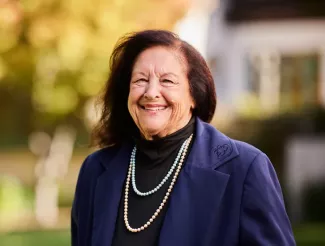Dr. Eliana Delgado

Interview with Dr. Eliana Delgado by medical student Jessica Abrolat. Dr. Delgado is a Professor in the Department of Orthopaedic Surgery at UCSF. She completed her orthopedic surgery residency at UCSF and a pediatric orthopaedic fellowship at Shriners Hospital for Children – St. Louis.
JA: Thank you for taking the time to share your insight with the Muriel Steele Society. To start, what is the best piece of advice you’ve ever received?
ED: One thing that comes to mind, which is important to survive in orthopaedics, is to promptly do something that you’re asked to do. If you’re told to go split the cast, you need to make sure it’s done before you go home. When there are important tasks like this that are delayed, you can have worse outcomes like a too-tight cast left on. However, just because something should be promptly addressed, doesn’t mean we can’t ask questions. It’s important to promptly do the task, write down questions that you have during it, and then look those up later. These three steps are something I learned from my rotations: Do it now. Take care of the patient right now. Write it down. You can document what you did or questions you had. Then look it up. Spend some time researching your questions afterward to improve your knowledge. It works really well, and it can apply both in medicine and in your life outside of the hospital.
JA: I really like the proactive approach to both patient care and learning. What are you most proud of personally and/or professionally?
ED: For this one, I can quote Lorraine J. Day, who was the Chief of the General, and she would say ‘if you’re a patient advocate, you’re never wrong’. I’m so proud of being a patient advocate because it’s important to understand things from their point of view in order to connect with and help them. By seeing the world from other’s eyes, we can better understand how we can offer support to help them achieve their best. I also advocate outside of work and can put other words besides patient in there: friend, partner, etc. I love helping people reach their fulfillment.
JA: I love that. What impact has mentorship had on your career?
ED: I would say it has been crucial to my academic advancement, especially because the steps to becoming a professor are not clear. You don’t know what you don’t know, and can do a great job at work every day but still miss an important step for career development. This is where a mentor can help facilitate seeing something that we may not even recognize is important. Mentors are great because they can share their experiences, ideas, and pearls of the trade. When someone shares a new thought, it can help open our eyes to something we were previously blind to and allow us to better understand both ourselves and the world around us. This is also why having different mentors is also really important. They each bring something unique to the table, which deepens our learning. In my experience, mentorship should also be a two-way street where both of us mutually benefit in our mentor/mentee relationship.
JA: What is one thing you know now that you wish you had known during your training?
ED: I would say that I wish I had known how important preparation is and how often you will be preparing for things: tests, procedures, presentations, and so much more. This can be especially hard to juggle during residency since you are so busy, but there is always something to be preparing for. It’s important to also keep in mind that people learn differently, so it’s okay if the material you select is different from others, be it books, magazines, lectures, or having meetings with mentors. Mentors can be so helpful with preparation because they are a good reference and can share the lay of the land. This type of briefing will help you know what to expect and what reading material will help you prepare for a case.
JA: Finally, what would you recommend to medical students who are exploring different specialties?
ED: I think it’s important to envision yourself in 5 or 10 years and reflect on where you would like to be or what you see yourself as. It’s important that students be true to themselves and pursue a specialty that reflects their values. Where there is a will, there’s a way. But it’s also important to be frank and recognize that it might not always be possible to pursue the first specialty you enter school thinking you’ll do. There’s still a lot of value and joy in pursuing option B, because if we like caring for people who are ailing, it shouldn’t matter if you’re a paramedic, EKG tech, nurse, doctor, or surgeon. In other words, there are a lot of great specialties that help patients, and by envisioning how each lines up with your preferences, you’ll be able to find something that works well. It’s not about the final destination of your career but the journey along the way. Keep an open mind, because many interns are in a different specialty than what they thought they would do at the beginning of med school. So, enjoy the journey.
